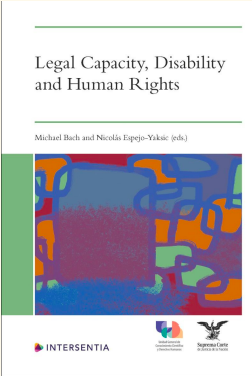In 2020 the Mexican Supreme Court commissioned a study on the jurisprudence and implementation of the human right of legal capacity around the world. The subsequent Report, covering numerous countries and geographic regions (which, of course, was in Spanish) has been translated into English and recently published as the definitive study of the subject, Legal Capacity, Disability and Human Rights, edited by Canadian Michael Bach (who key-noted our initial Advisory Council meeting) and Chilean Nicolas Espejo-Yasik. SDMNY Founding Director Kris Glen authored the chapter on the United States which traces the relationship of the US to human rights treaties, reviews the history of guardianship and guardianship reform, considers existing SDMA statutes in other states in detail, and concludes with the groundbreaking accomplishments of SDMNY that provide inspiration to advocates around the world (click here to read the chapter).

We’ve always said that, at its most basic, our work is premised in human rights and, in particular, the human right of legal capacity set forth in Article 12 of the UN Convention on the Rights of Persons with Disabilities (CRPD). But unlike every other country included in the new volume, the U.S. has not ratified the CRPD, for reasons explained in Kris’s chapter. Unlike some of the countries whose efforts are chronicled, there have been no legislative or judicial pronouncements about the necessity to totally abolish guardianship and all other forms of substitute decision-making, nor of the right of everyone to make their own decisions and have those decisions legally recognized.
Yet alone, among nations with dramatic legal reforms like Costa Rica, Peru, Columbia and Mexico (Good News 9/15/2023) or expansive national reports based on empirical evidence, like Australia, or extensive and successful pilot projects (from which we learned so much) and far sighted legislative proposals in Bulgaria, SDMNY and New York State have uniquely accomplished legislative and judicial support for limiting guardianship based on supported decision-making (the right to make one’s own decisions); an actual legal requirement that third parties must accept decisions made by Decision-Makers with facilitated SDMAs (the right to have ones decisions legally recognized). And, unlike anyone else, anywhere, including the U.S. states with SDMA statutes, a process for providing support that has been extensively piloted and validated, with a commitment from New York State, to make that facilitation process available to everyone with I/DD who wants it (the CRPD obligation to provide the necessary supports to enable the right of legal capacity).
Just as we are the only state to require a meaningful process to ensure the integrity of SDMAs that require legal recognition, we are the only jurisdiction in the world that is actualizing provision of the “supports necessary to exercise legal capacity” for everyone with I/DD. We think that’s pretty amazing–and pretty great! While we acknowledge with gratitude all we have learned, and continue to learn, from our colleagues around the world, we are enormously proud at what we have been uniquely able to accomplish.
CONGRATULATIONS, AND THANKS, TO NEW YORK’S GOVERNOR,
LEGISLATURE, OFFICE OF PEOPLE WITH DEVELOPMENTAL
DISABILITIES, AND EVERYONE IN OUR SDMNY COMMUNITY FOR
LEADERSHIP IN CREATING A VIABLE MODEL FOR THIS MOST CRITICAL
HUMAN RIGHT!